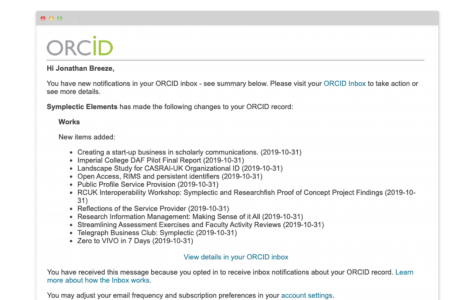
We are pleased to announce that our latest release includes our first ‘write’ integration with ORCID! We have been a long-standing supporter of ORCID and over the years have incorporated ORCID iDs across Elements in a number of ways.
This new functionality provides users with the option of sending publications from Elements to their ORCID record. This lowers the barrier to data reuse for researchers and contributes to ORCID’s mission to enable transparent and trustworthy connections between researchers and their research contributions.
During the development process we consulted our community and worked alongside ORCID to ensure our integration gives researchers absolute control over their data and research profile, while being quick and simple for them to enable.
Image: The image on the left is an example of how ORCID will notify users when Elements makes a change to their ORCID record. As you can see, the title and date added to ORCID are shown. These notifications can be managed in ORCID
“ORCID is very excited about Symplectic’s introduction of the new Elements Write integration! This new functionality demonstrates Symplectic’s commitment to lowering barriers to reusing research information, helping us achieve our shared vision of making it easier for researchers to share their contributions as they navigate their workflows.”
– Laurel Haak, ORCID Executive Director
The Elements write integration ensures:
- Users retain complete control over the publication data sent from their Elements system to ORCID. Including the ability to push only a selection of publications (known as ‘favourites’ in Elements) and/or to push only published outputs to ORCID (i.e. not journal articles at the ‘accepted’ stage).
- Users can change their minds as to what data is sent to ORCID, including the ability to remove all publications already pushed to ORCID from Elements, should they wish.
- Administrators can leverage the flexibility of Elements by choosing how to map any custom publications (e.g. creative works) created in Elements to the relevant ORCID item.
- Users automatically receive metadata updates made in the Elements platform to their ORCID record in a timely fashion.
Users will need to enable the settings in their Elements instance to receive these features. If you are an existing Elements client, as well as a member of ORCID, and would like to start using these features, please see our Support Site for more information.